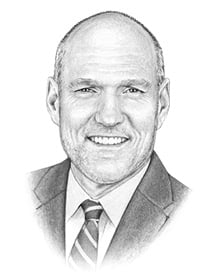Xi’s China Is Good—and Bad—for the United States
The strategic implications of the 20th Party Congress cut in two different directions.
It’s now a cliche to say we are in a new era of great power competition, but that doesn’t make it untrue. The new U.S. national security strategy, the recently released national defense strategy, and the imposition of draconian export controls on advanced computer chips and related technologies make it abundantly clear that the Biden administration sees China as a long-term strategic rival. Chinese President Xi Jinping and his associates appear to have a similar view. Fasten your seat belts: It’s going to be a bumpy ride.
It’s now a cliche to say we are in a new era of great power competition, but that doesn’t make it untrue. The new U.S. national security strategy, the recently released national defense strategy, and the imposition of draconian export controls on advanced computer chips and related technologies make it abundantly clear that the Biden administration sees China as a long-term strategic rival. Chinese President Xi Jinping and his associates appear to have a similar view. Fasten your seat belts: It’s going to be a bumpy ride.
Considering this situation, how should we interpret the recent 20th National Congress of the Chinese Communist Party (CCP)? It provided abundant grist for professional China-watchers, including moments of drama such as what appeared to be the public humiliation of Xi’s predecessor, Hu Jintao. Xi received an unprecedented third term in power, solidified his grip by appointing more loyalists to key positions, sidelined economically oriented technocrats in favor of officials with a more statist orientation, and likely made himself president for life. As Kevin Rudd notes, economic growth and development are no longer the top priorities; national security and preserving the authority of the CCP are.
I’m hardly a China expert, but one doesn’t have to be to understand that relations between the world’s two most powerful countries and the balance of power between them will have profound effects on many aspects of world politics. This raises an obvious question: What impact will the decisions taken at the recent Party Congress have on the balance of power and U.S.-China competition? From a U.S. perspective, was what just took place in Beijing good news or not?
My problem is that I can tell you two stories about this event: one that should make Americans relax a little and one that should make us all more nervous. To make matters worse, these contrasting stories aren’t mutually exclusive and could even be mutually reinforcing.
Let’s start with the good story, as seen from a U.S. perspective.
What happened in Beijing suggests that China is now reverting to the same kind of one-man rule that delayed its emergence as a major power for decades. China is already facing significant headwinds—a slowing economy, an aging population and shrinking labor force, and growing international concerns about its power and ambitions. Some of these developments were unavoidable (e.g., growth invariably slows as economies mature, and demographic imbalances cannot be fixed overnight), but they have been exacerbated by Xi’s rigid zero-COVID policy, his crackdown on China’s high-flying tech sector, and the bellicose “wolf-warrior” approach to foreign policy that China has embraced during Xi’s rule. And China’s problems go beyond U.S. efforts to restrict access to technology; Asian and European states have become increasingly wary about close economic ties with China as well. Although German Chancellor Olaf Scholz and others are still trying to keep these doors open, broader trends (including the European Union’s decision to suspend a previously negotiated investment agreement) suggest that the openness that facilitated China’s rapid rise is beginning to close.
Given these unfavorable developments, the recent Party Congress might have been an opportunity for a midcourse correction, but the exact opposite occurred instead. Xi elevated officials with a statist orientation over more economically oriented technocrats, packed the top leadership bodies with loyal cronies, and continued his campaign to establish himself as a leader on par with Mao Zedong.
This may be bad news for Chinese businesses and ordinary Chinese citizens, but it could be good news for the United States, because Mao was in many ways a disaster for China. He may have been a brilliant revolutionary leader and wartime strategist, but he had no idea how to run an economy or establish the material foundation for enduring global influence. His largely unchallenged leadership left China’s enormous potential untapped for decades, led directly to disasters such as the Great Leap Forward in 1958 and the Cultural Revolution of the 1960s, and caused enormous human suffering, almost entirely within China itself. It was only after Mao died and his policies were abandoned that China began its remarkable rise. Recognizing the dangers of relying on a single, “infallible” leader, Mao’s successors attempted to enshrine principles of collective leadership and prevent a tragic repeat of past follies.
Under Xi, however, China is headed back in the other direction. Open criticism of Xi is now effectively impossible, which means that his policies—no matter how ill conceived—are going to be implemented. If they backfire—and some of them will—they will be hard to reverse. It is no accident that Chinese stocks tanked in the aftermath of the Party Congress once investors grasped there would be “no adults in the room” on economic policy. Unless one believes that Xi is the first completely infallible political leader in history—and he’s already proved that he isn’t—his consolidation of power means that China is going to be less wealthy, less powerful, and less appealing to foreign populations than it would have been under a less willful leader whose associates could question his choices and rein in excesses. Looking ahead, who is going to tell Xi when he’s wrong? Won’t subordinates be even more inclined to tell superiors what they think the latter want to hear and suppress bad news, lest it reflect poorly on them? This is a recipe for inefficiency that also increases the risks of monumental mistakes. All in all, the new configuration of power in Beijing will aid U.S. efforts to retain a position of primacy.
But hold the schadenfreude—there are big downsides here, too. I can think of at least three potential problems.
First, declining Chinese economic growth may be good for the balance of power between Washington and Beijing, but it’s not good for a world economy that is already teetering on the brink of recession. If China under Xi continues to stumble, lots of other economies—including ours—will suffer, ordinary people in many other countries will hurt, and extremists of all sorts will benefit.
Second, the greater priority placed on national security issues (and the decision to elevate them over economic growth) is an obvious illustration of spiral model dynamics at work. China’s rising power and growing ambitions have prompted a defensive reaction by the United States and others. Not surprisingly, Beijing now recognizes that the international environment is more perilous and seeks to protect itself against U.S.-led efforts to constrain its future growth.
Unfortunately, deteriorating relations between the two countries have already made it more difficult to address common challenges such as climate change and are likely to make it even harder to cooperate on such issues in the future. On climate change, China and the United States are beginning to look like a couple of paddlers on the Niagara River fighting to decide who gets to sit in back and steer, even as their canoe careers toward the falls.
Third, as I noted a few weeks ago, when countries are led either by unchecked autocrats or small groups of like-minded people (with nary a dissenter in sight), they are more likely to make big blunders and will have more trouble correcting them when they do. Democracies aren’t immune to this danger, but it seems to be more prevalent in highly centralized dictatorships. If so, Xi’s consolidation of power means we should expect Beijing to be more error-prone in the future than it has been for most of the post-Mao era. That’s not good news, however, when some of the mistakes they might make—such as trying to retake Taiwan—would be extremely dangerous.
That’s where my two stories could come together. If Xi Jinping’s centralization of power saps China’s economic vitality even more and compounds the structural problems it is already facing, then any hopes he may have to equal or surpass Mao as China’s greatest modern leader will be jeopardized. Any claim to have equaled or surpassed Mao would depend on doing something Mao failed to achieve, such as regaining formal control of Taiwan. If he begins to suspect that China’s relative power has peaked, the temptation to act while he still can will grow. Talking openly about this goal alarms others, and attempting it would be a huge gamble, but this is also the sort of miscalculation that autocrats (or closed decision-making groups) are prone to make.
There’s one more reason for Americans to temper their satisfaction at seeing China moving away from market principles, relying more heavily on Marxism-Leninist teachings, and eschewing collective leadership in favor of a one-man cult of personality. The U.S. political system is in deep trouble, too, and there’s ample reason to expect things to get worse after the midterm elections. The world’s two most powerful states seem to be engaged in a relentless competition to see which system can become most dysfunctional fastest. Unfortunately, and despite what just happened in Beijing, I’m not sure that China is winning.
Stephen M. Walt is a columnist at Foreign Policy and the Robert and Renée Belfer professor of international relations at Harvard University. Twitter: @stephenwalt
More from Foreign Policy

How the West Misunderstood Moscow in Ukraine
Ten years ago, Russia’s first invasion failed to wake up a bamboozled West. The reasons are still relevant today.

Asian Powers Set Their Strategic Sights on Europe
After 500 years, the tables have turned, with an incoherent Europe the object of rising Asia’s geopolitical ambitions.

The Winners From U.S.-China Decoupling
From Malaysia to Mexico, some countries are gearing up to benefit from economic fragmentation.

Another Uprising Has Started in Syria
Years after the country’s civil war supposedly ended, Assad’s control is again coming apart.







Join the Conversation
Commenting on this and other recent articles is just one benefit of a Foreign Policy subscription.
Already a subscriber? .
Subscribe Subscribe
View Comments
Join the Conversation
Join the conversation on this and other recent Foreign Policy articles when you subscribe now.
Subscribe Subscribe
Not your account?
View Comments
Join the Conversation
Please follow our comment guidelines, stay on topic, and be civil, courteous, and respectful of others’ beliefs.